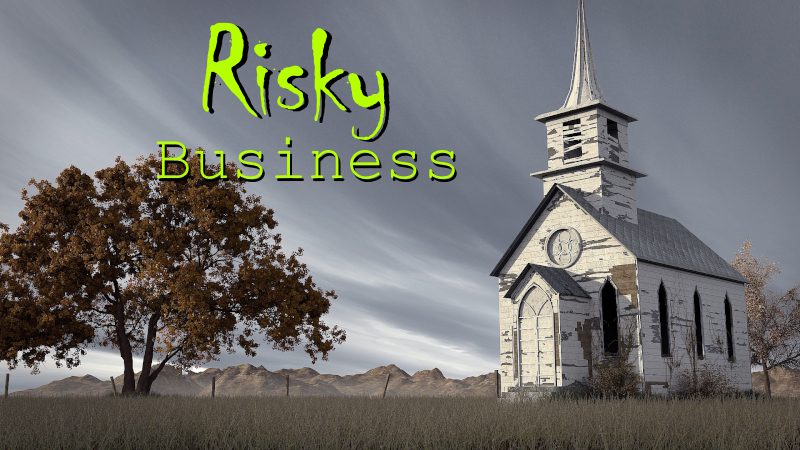A congregation of the United Church of Canada

Yr A ~ Pent 24 ~ Matthew 25:14-30
The problem with this Parable of the Talents is that it has nothing really to do with talents! I mean, obviously it does, but it really doesn’t. The problem is in the translation. We hear the word ‘talent’ and our English ears instantly associate it with a gift, or skill, or ability that someone has. So when the infamous 3rd servant in the story buries their ‘talent’ instead of using it, we immediately associate that with being a bad thing. The flaw in that is that the ‘talent’ that Jesus was speaking of has nothing whatsoever to do with someone’s ability. It is simply a unit of measure for money. And that core error in understanding has led us to misinterpret this story for a very, very long time.
Now, it’s not that “not wasting your talents” is a poor message – it’s actually a great message – it’s just not at all the message Jesus was teaching here. We need to always remember that parables are ‘thought bombs’ – they’re meant to turn your brain inside out – and the surface reading is almost never the real, deep meaning.
So, let’s look at this closely. We’re going for a ride! Quick economics lesson. One ‘denarius’ was a typical wage for a day labourer back then. One ‘talent’ was equal to 6000 ‘denari’ – that’s about 15 years of a labourer’s wages. The first slave was given 5 talents – that’s like 75 years’ worth of wages!!! – we’re talking a couple of million dollars in today’s money – it’s an astronomical sum of money. What would you do if your boss entrusted you with a million bucks? Would you risk losing it all for the possible gain of doubling it? That’s what Slave #1 did. And their boss – the Master – praised them and rewarded them saying “enter into the joy of your master”.
There are three servants – the two who invest their ‘talents’ are called good and trustworthy, and the one who hides theirs in the ground is called wicked and lazy. So, “which of the three servants are you?” (Be careful who you choose!) You most likely wish you were the first – big risk, big return – but would modestly accept that you’re probably the second – but you’d be horrified if you were associated with the third at all.
I mean, look at what that 3rd servant did – that coward. They knew their Master was a harsh and cold-hearted person – that the Master reaped profit where they didn’t even sow – and that they gathered reward where they themselves risked nothing. So the 3rd slave hid the money in the ground (which was actually the lawful thing to do by the way), and gave back only what the Master had first given them. The Master didn’t even get simple interest on their money – the slave completely took it out of circulation.
So the Master loses it on this slave – they say, “So you knew I was harsh and profited where I didn’t really deserve to, did you? Well, I’m taking away from you what I gave you and I’m giving it to slave #1 – because to all those who have, more will be given – and losers like you deserve to lose everything – and I’m chucking you out of my house – you can go live in the darkness.” Does that sound like the Kingdom of God to you?
Anyone feeling uncomfortable yet? I’m going to offer you a radically subversive interpretation of this parable. You may not be able to go there with me, but I find it utterly compelling.
Yes, Jesus spoke about money a lot, but what did he say about it? Get all you can however you can? The rich are supposed to get richer at the expense of the poor? That may be how the world is – the conventional wisdom – but doesn’t Jesus usually turn the world upside down? – isn’t his relevance and genius for us that he reveals the unconventional wisdom of God? Where’s the thought bomb in this parable?
Who’s the Master in this parable and who’s the hero? Conventional wisdom says the Master is God and the hero is Slave #1. Oh really?! So God is like a harsh and cold-hearted person that reaps profit where they don’t even sow and gathers reward where they themselves risk nothing? Does that sound like God to you? And the hero is the one who when given an exorbitant amount of money to be the steward of, plays the game and doubles it to win favour with their Master so they’ll get brownie points? Does that sound like the Way of Jesus to you? Doesn’t Jesus teach that the last will be first? And those that exalt themselves will be humbled?
Jesus’ parables take common, everyday situations and turn the conventional wisdom of the day on its head. What’s the revolutionary, counter-cultural, subversive reading of this parable? The master isn’t God – it’s a real master – just like the peasants would’ve worked for. And the hero isn’t Slave #1, or #2 – the hero is Slave #3 – you know, the one nobody wants to be like – the one who seemingly risked nothing and hid the master’s money in a field. (Has your head exploded yet?!)
But in reality, the 3rd slave risked everything. They dared to stand up to their oppressor and try, in their own limited way, to break the cycle of poverty and hardship that defined their life. They looked their oppressor in the eye and told them the raw, hard truth about their injustice – “You are not God! You are a harsh and cold-hearted person. You don’t deserve the profit you take. So I took your money and hid it, so it couldn’t be used to enhance your greed or to hurt anyone else. I took it out of circulation so you couldn’t even get simple interest on it.”
Now that’s subversive! And as a punishment Slave #3 gets called names (like ‘socialist’) and is cast out of the master’s house and into the darkness where the master believes there will weeping and gnashing of teeth. Because if you don’t buy into the value system of domination and capitalism you are obviously worthy of suffering, right? Hmm.
The unconventional wisdom of God here is that true risk and commitment aren’t just about “spending your assets spiritually” – true risk is about speaking the truth about money and its power – true risk is about orienting ourselves toward God and not the almighty buck. Risk is life-giving – but we have to be willing to pay the cost. To actually really believe this stuff and to live out our faith may cause us some discomfort – at least in the eyes of the world’s ‘masters’.
Risk is good but it’s, well, risky. To laugh is to risk appearing the fool. To weep is to risk appearing sentimental. To reach out for another is to risk involvement. To expose feelings is to risk exposing your true self. To place your ideas, your dreams, before a crowd is to risk ridicule. To love is to risk not being loved in return. To live is to risk dying. To hope is to risk despair. To try is to risk failure. But risks must be taken, because the greatest hazard in life and in faith – is to risk nothing.
So, no, I don’t think this parable is really about the evils of hiding your God-given talents in the ground out of fear (although, that’s not good) – it’s about risking our very selves for the sake of living faithfully as followers of the Way of Jesus – not about putting our money to use, but putting our money where our mouth is.
In today’s parable I’ve made the rich guy the bad guy, and I’ve cast the hero as someone who refuses to participate in the domination/exploitation system. But here’s the uncomfortable rub. We have to live in the world. And, bluntly put, even the church needs money.
In a few minutes we’re going to have a short congregational meeting during worship. One of the items on the agenda is an update on this church’s financial picture. I’m going to warn you, it’s not where we’d like it to be. At all. We’ve experienced a triple whammy in the last few years – huge physical plant repairs (like a roof!) – three years of disrupted use of the building because of Covid, which meant no rentals or fund raisers – and, like just about every other church in the world, a smaller number of congregants post-Covid, partly due to aging, partly due to families that found new rhythms while apart from church for so long.
The wonderful news is about your continued generosity. Our weekly/monthly offerings and donations have held pretty steady even with those challenges. That’s a testimony to everyone’s commitment to this church. Thank you. And, we need you to give more, if you’re able. (Yes, I understand my glaring conflict of interest speaking about this!) To get on a strong financial footing we’re going to need a multi-pronged approach. More givings, more congregants, more rentals, more fundraisers, more creative ways of generating income. The challenge is to address all that while holding on to this profoundly inspired but difficult teaching from Jesus. Nobody ever said theology and faith were easy. Money is going to be a hot topic for us for quite some time.
Money and a life of faith need not be in conflict with one another. Money is neither good nor evil – it’s all in how you use it – how highly you value it – how tight its grip on you is. We can’t look at the 3rd slave and say “Look, they didn’t care about money so they’re a good person.” What they didn’t care about was what the master (the world) told them was important – for the slave had something of far surpassing value – the Kingdom of God. But that doesn’t mean we can ignore our money issues because they’re too earthy; it means we bring our faith to bear on them.
Wouldn’t it have been great if Jesus told us about the 4th Slave? You know, they’re the one who accepted the master’s money, took it and made a modest return on their ethical investments, gave back to the Master the principle plus a fair amount of interest, and gave all the rest to their local church? That’s my favourite slave! If Jesus had told that story ministers could point right at it and say “Look, here’s what to do with your money and the church.” But he didn’t. There is no 4th slave in the story. So we have to chew on it ourselves. We have to find the right balance for ourselves between living and giving – between our love of God and our love of money – between the ultimate ideal of the Way of Jesus and the realities of having to live, and work, and operate a church today.
What’s the faithful thing to do with our money? Like it or not the truth is that we do live in a capitalist society, and money is an important aspect of who we are and how we value things. The more we value something the more we’re willing to pay for it. So we should think of our offering as a spiritual thing. It’s not another bill to pay, it’s an opportunity to say “I value this – it’s important to me – and I’m going to express that in a tangible way.”
We want everyone to value this church – the people here, the ministry we share, the Way we strive to journey together. We ought to be about investing our ‘capital’ here – our spiritual capital, our emotional capital, our physical capital, and our monetary capital – to grow a strong church that seeks to serve the needs of this faith community and the community beyond our front door.
Today’s society demands bang for the buck – “what’s in it for me?” It’s a fair question. You’re likely here because you’re seeking a connection with the Holy – because you hunger and thirst to commune with God – because you’ve heard of a man so full of God that his life, death, and resurrection changed the world, and you wonder if his Way could really change you too – because coming to this place recharges your batteries, renews your focus, refreshes your Spirit, revitalizes your life, gives you a place to give back to the community.
We celebrate the gift of opening our hearts to the love of God and trying to follow the Way of Jesus – and that’s risky business indeed – but it’s exactly the kind of business we’re called to engage in. What’s in it for you? The way of the 3rd Slave – risking all for the reward of living in the light of God’s grace – a gift beyond any earthly value – a faith that transforms your heart and fills you with peace, and joy, and hope – a gift that cannot be earned or bought, but can only be accepted.
That’s what’s in it for you! And if we live that risky, faithful way, then we’re living in love. And ultimately, that’s the most important thing. Amen.



